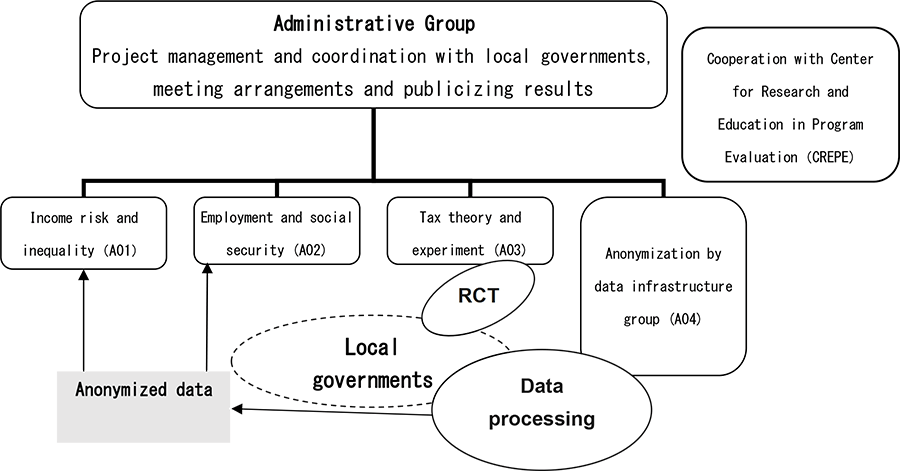Objective: To develop an infrastructure for academic use of municipality administrative data and its application to economic analysis
- Establish a system that allows many social science researchers to easily make academic use of administrative data from across the country while protecting personal information by cooperating with local governments nationwide and the participation of legal scholars and information engineers.
- Conduct empirical analysis in areas such as income risk and inequality, employment, and social security, and obtain implications for socially desirable policies based on tax and welfare data.
Detailed and accurate individual-level data on taxes, welfare, and education held by local governments can serve as a foundation for the development of a wide range of social science fields including economics, sociology, public administration, and education; however, the use of such data has not progressed because of the protection of personal information. Utilization of administrative data will enable analysis that is not possible with existing survey data, and will contribute to the revitalization of empirical social science.
Usefulness of local government administrative data and obstacles to its utilization
To date, the data used for empirical analysis in the social sciences have mainly been based on surveys conducted on households selected from the population. However, administrative data from local and national governments have many advantages over information obtained from household or establishment surveys.
However, thus far, the academic use of such administrative data has been impeded in Japan. This is because administrative records contain sensitive personal information, and if used for purposes other than the original one, there is a significant risk of invasion of personal privacy. technical solutions to overcome this problem have not been shared or practiced.
These obstacles have also contributed to Japan falling behind in international standards for quantitative and empirical social science research. Based on this recognition, this research area aims to promote the academic use of administrative data and raise the level of research in Japan to that of Europe and the United States.
Management of the research area
This research area consists of the data infrastructure team (A04) which oversees data development, and other research groups (A01-03) that conduct economic analyses using the data. The key to the future development of the entire research area is for each research group to communicate its research needs to the development team and participating local governments and promote data development in a form that is easy to use for academic research.
The participating local governments will work together with the data infrastructure team (A04) to perform processes such as anonymization and joining databases. The data thus provided will be analyzed by other research groups (A01-03). In some cases, the results of each group were used as materials for the research of other groups. Additionally, the tax theory and experiment group (A03) will conduct randomized controlled experiments (RCTs) on tax collection measures in cooperation with the local governments that wish to do so.
We also cooperate with the Center for Research and Education in Program Evaluation (CREPE) and the Research Institute of Economy, Trade and Industry (RIETI).

Ripple effects and future development of this research area
In addition to the academic contributions that each research group is expected to make in their respective fields, we plan to expand our datasets to cover education-related data, which is another type of operational data possessed by local governments. This expands the possibility of examining a wider range of questions.
The value of the data we construct from administrative records will increase with the number of researchers who can utilize the data. We plan to make the data accessible to as many researchers as possible through various forms of anonymization. In the future, we would like to establish a system whereby researchers who wish to conduct research on themes that cannot be adequately studied with anonymized data alone can participate through publicly solicited research.
